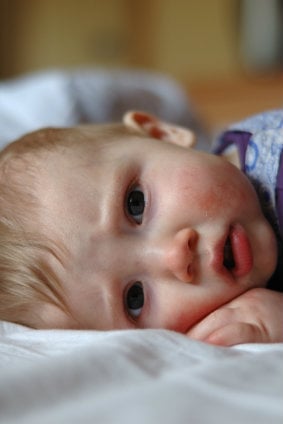
Ten things every parent should know about RSV, or respiratory syncytial virus
21 November 2024
Respiratory syncytial virus (RSV) causes an infection of the lungs and respiratory tract.
In healthy adults and children, it can manifest itself only through cold-like symptoms: nasal congestion or discharge, throat irritation, mild headache, cough, fever and feeling unwell. However, in newborns, premature babies and children with lung, heart or immune disease, RSV infections can be much more serious.
1. RSV is the leading cause of respiratory illness in babies.
For most babies and young children, RSV infection causes nothing more than the common cold. However, in newborns, premature babies and children with chronic illnesses or weakened immune systems, an RSV infection can lead to much more serious problems. A certain percentage of these high-risk children may develop bronchiolitis, an inflammation of the small airways in the lungs, or life-threatening pneumonia.
2. RSV is highly contagious.
RSV can be spread by droplets containing the virus that are projected into the air when a person coughs or sneezes. The virus can also live for several hours on various surfaces (such as counters, doorknobs or toys) and on hands, so it spreads easily when a person touches a contaminated object.
3. RSV infections often occur during the winter months in Quebec.
While an infection usually lasts a week, some cases can last several weeks. RSV can spread rapidly in schools and daycares. Babies often contract it through contact with older children, who carry the virus from school to home and pass it on. Almost all children contract the virus at least once before the age of 2.
4. Parents and other adults can easily transmit RSV to young children.
Since the symptoms of RSV infection resemble those of the common cold (runny nose, throat irritation, mild headache, cough and sometimes fever), parents and other adults are not always aware that they are infected with the virus, although they may still be contagious. They can therefore easily transmit it to children at greater risk through direct contact.
5. You can take action to prevent an RSV infection.
Here are a few tips that can help avoid passing the virus on to your baby:
- Ask people to wash their hands before touching your baby.
- Avoid kissing your baby if you have cold symptoms.
- Keep your baby away from crowds.
- Wash your baby’s toys and environment regularly.
- If your baby or toddler is at high risk, limit the time they spend in daycare, especially from late fall to early spring, when RSV is most prevalent.
- If possible, keep your baby away from anyone with cold symptoms, including siblings.
- Avoid places where smoke is present.
6. To prevent RSV, infants can receive a passive immunization agent called nirsevimab.
Nirsevimab is given the same way as a vaccine—as an intramuscular (I.M.) injection into the muscle tissue—but it is not a vaccine.
Unlike a vaccine, a passive immunization agent provides pre-made antibodies (produced in a pharmaceutical lab) that offer immediate but temporary protection without stimulating the body’s immune response. This is why the usual vaccine side effects, such as fever or irritability, are not typically seen with nirsevimab. The body is passively receiving protection rather than creating it.
For babies born during the RSV season (November 1 to March 31), the dose is administered at the hospital of birth before discharge. For babies born before the RSV season, the dose is given at the CLSC with the 2-month or 4-month vaccine, or by appointment through Clic Santé. For babies with certain medical conditions, the dose is available by appointment through Clic Santé or in the hospitalization units and certain outpatient clinics at the Montreal Children’s Hospital.
7. Antibiotics are of no use against RSV.
Fortunately, most cases of RSV infection are mild and do not require special treatment by a physician. Antibiotics are not useful because RSV is a virus, and antibiotics are only effective against bacteria. Some children may be given medication to help clear the airways and improve breathing.
In infants, however, RSV infection can be more serious, requiring hospitalization and close monitoring. They may need additional fluids and treatment for respiratory problems.
8. In healthy children, it is not necessary to distinguish an RSV infection from a common cold.
Most healthy children will be able to fight off an RSV infection. However, if a child has another health problem, their doctor may want a more precise diagnosis. In that case, RSV is identified by analyzing nasal secretions collected with a cotton swab or by sucking with a bulb syringe.
9. For most babies and young children, treating an RSV infection at home is sufficient.
Home treatments include:
- Removal of nasal secretions using a bulb syringe and saline nasal drops;
- Use of a cold-air humidifier to keep room air moist and facilitate breathing;
- Frequent administration of small amounts of fluids during the day;
- Administration of a non-aspirin fever-relieving medication, such as acetaminophen.
For babies with more serious problems requiring hospitalization, treatment may include the administration of:
- Oxygen
- Intravenous fluids
- Medication to clear the airways
10. But there’s good news! An RSV infection is totally preventable.
There are a few things you can do to protect your child from RSV. First, keep babies under 6 months away from people with colds, and clean and disinfect hard surfaces. Wash your hands and make sure your children wash their hands often to reduce the spread of germs.
Breastfeeding can also help protect your baby against RSV and other illnesses. Breast milk contains antibodies and other immune factors that help prevent and fight disease.
Make sure your child receives all recommended vaccines. They won’t prevent your child from catching a cold, but they will protect them against certain cold complications. Finally, avoid smoking in the car or in your child’s room. Exposure to tobacco smoke can increase the risk of RSV-related illnesses.
